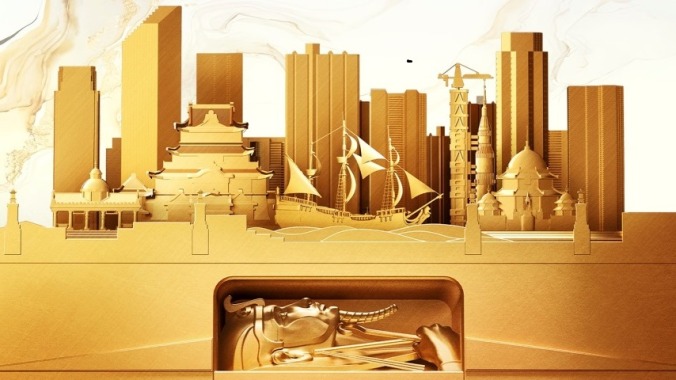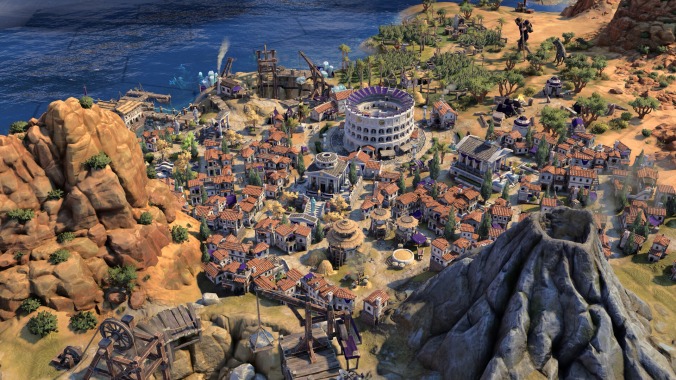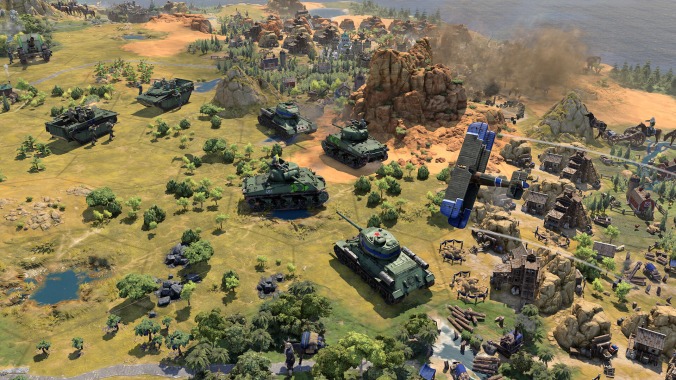With Civilization VII, Firaxis Wants Everybody To Rule The World
A strong focus on new ideas to help new players get in, get going, and start telling their own epic stories only makes a great game greater.

In its opening movie Civilization VII lays out its greatest change and a new entire paradigm of play. A sword is found, passed around, lost and recovered, restored, buried, over and over. Moving backwards and forwards, the low commanding roll of Gwendoline Christie’s voice reminds us that history is made from layers of civilizations. The imperfectly stacked, often churning, layers of hopes, fears, triumphs, and disasters. Faces and clothes change. Buildings change. But always two things are true: the sword and a person. History is made up of the decisions of the people who lived through it and their lives are transcribed in what remains.
Sometime in mid-300 BCE, the Empress of Rome, Isabella I, interred the body and empire of Xerxes of Persia in that same geo-historical strata. It didn’t have to be this way. But he made one exceedingly bad decision. And in the long game of history, decisions have consequences far larger than the individual.
But it all started with one woman and a city: Roma. Nestled just back from the coast alongside an estuary and three mountains (Kilimanjaro, Stromboli, and Vesuvio), the early years of Rome were ones of quiet expansion. Farms developed, granaries were built. The population swelled and settlers moved off to found newer villages. Horses and sheep were raised in Mediolanum. As Rome expanded, cotton and marble were discovered. A great deal of effort went into the civic and technological planning of Isabella’s city-state. While in this nascent era Rome’s wealth and stability was all but assured, she wanted more for her people. She wanted Culture.
Rome needed culture. And that’s what Isabella set out to give her people.
Aside from the huge roster of leaders and a wealth of civilizations to pair them with, the first two obvious distinctions in Civilization VII are Ages and Legacy Paths. Instead of each civilization being on its own trajectory towards modernity, now games will take place in three discrete phases, each with their own cultures, technologies, and narrative arcs. They start off slow, build to crescendo, and then conclude. Guiding players and their chosen civilization through those Ages is the Legacy Path—four distinct timelines of advancement that not only push the age forward and determine how your reign will be remembered, but inform how you will start the next Age. Think of it as playing three smaller games of Civilization that feed into a much larger overarching game of Civilization.
For centuries, Isabella had worked tirelessly to bring culture to not just Rome, but to all people. As the empire grew, it made connections: Xerxes of Persia, Himiko the High Shaman of the Khmer, and Hatshepsut of Egypt. Despite language and cultural differences, they overcame geography and time to forge a continental alliance of mutual cooperation and trust, connecting the far corners of the known world with science, industry, and culture. Open borders, free trade. Isabella brought about a Pax Romana that lasted over 2000 years, and not a drop of blood had been spilled to create it. Every civilization had all grown prosperous under her stewardship, expanding to new territories and growing bustling metropolises. Merchants sailed coastlines loaded with jade and furs from the arctic north. Kaolin from the clay pits of the central steppe made its way to farmland across our nations, enhancing harvest yields. Wine and pearls from the balmy southeastern peninsular coasts were abundant, not exclusive.
Even during times of hardship, Isabella made it work. When a solid third of Rome’s farmland and granaries were obliterated by the simultaneous eruption of Kilimanjaro, Vesuvius, and Stromboli—we found a way. Perhaps it was folly to found Rome with its back against three active volcanoes, but we put on our big girl pants and pivoted to the abundance of the Tyrrhenian Sea. Granaries became fisheries. We kept the Pax together. The peoples of the world were fed, cultured, employed, and happy, all thanks to Isabella’s shrewd negotiations and resourceful stewardship. Our connections made us stronger than the Category 5 Hurricane that threatened Xerxes’ port city of Bactria. Our alliances protected us.
And through it all, we created Wonders. Whether to honor the gods or rival them, who can say? But with an abundance of wealth and stability, Rome dotted the landscape with monumental architecture. It didn’t take long before Isabella’s own advisers were claiming this a Golden Age.
And then, in 780 BCE, Xerxes made a decision to attack Rome. A coastal assault from behind, on Roma herself. A decision that couldn’t be taken back. One that would change the course of everything.

Historians will no doubt say that Isabella should have been paying more attention to the Crisis unfolding around her. That clearly Xerxes’ happiness was dwindling, all the signs were there. His other metrics weren’t doing so great either. Science? Production? He was doing well enough. But he couldn’t abide sharing land. He disliked Isabella’s small but deadly and technologically superior military, how Rome had beaten him to the punch on two Wonders, that farmlands abutted on the imaginary line separating his empire from hers. It turned out that despite all the abundance of our alliances, pettiness, greed, and paranoia would be the undoing. He began rejecting trade deals, farmer cooperatives, and offers to coordinate on the building of Wonders. If he could find a way to be a petulant child, he would. But wasn’t Rome itself struggling too?
-

-

-

-

-

-

-

-

-

-

-

-

-

-

-

-

-

-

-

-

-

-

-

-

-

-

-

-

-

-

-

-

-

-

-

-

-

-

-

-









































